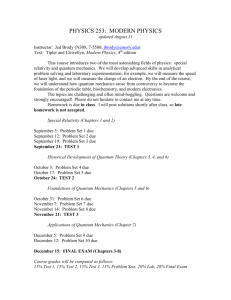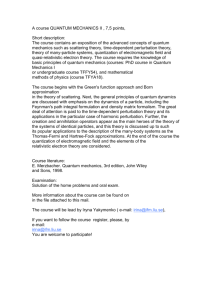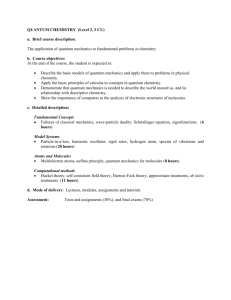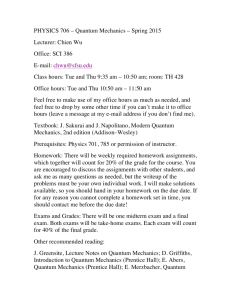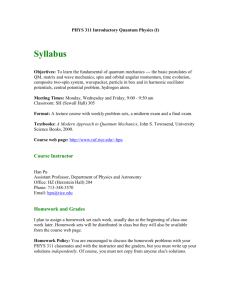425_syllabus_wi10 - Department of Physics | Oregon State
advertisement
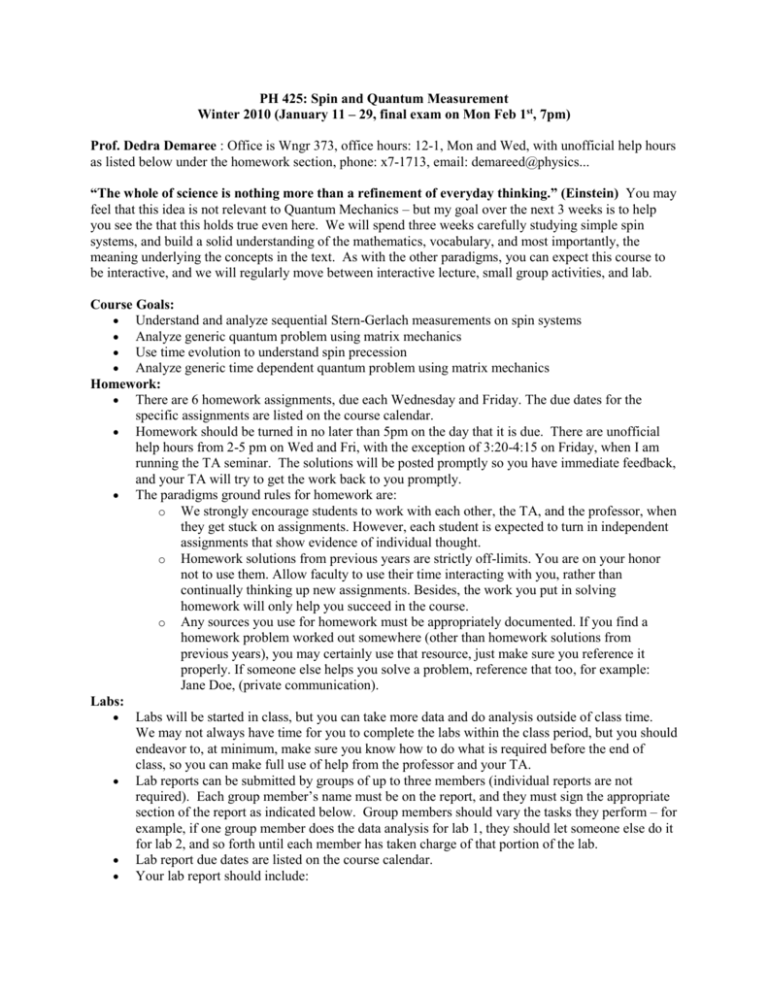
PH 425: Spin and Quantum Measurement Winter 2010 (January 11 – 29, final exam on Mon Feb 1st, 7pm) Prof. Dedra Demaree : Office is Wngr 373, office hours: 12-1, Mon and Wed, with unofficial help hours as listed below under the homework section, phone: x7-1713, email: demareed@physics... “The whole of science is nothing more than a refinement of everyday thinking.” (Einstein) You may feel that this idea is not relevant to Quantum Mechanics – but my goal over the next 3 weeks is to help you see the that this holds true even here. We will spend three weeks carefully studying simple spin systems, and build a solid understanding of the mathematics, vocabulary, and most importantly, the meaning underlying the concepts in the text. As with the other paradigms, you can expect this course to be interactive, and we will regularly move between interactive lecture, small group activities, and lab. Course Goals: Understand and analyze sequential Stern-Gerlach measurements on spin systems Analyze generic quantum problem using matrix mechanics Use time evolution to understand spin precession Analyze generic time dependent quantum problem using matrix mechanics Homework: There are 6 homework assignments, due each Wednesday and Friday. The due dates for the specific assignments are listed on the course calendar. Homework should be turned in no later than 5pm on the day that it is due. There are unofficial help hours from 2-5 pm on Wed and Fri, with the exception of 3:20-4:15 on Friday, when I am running the TA seminar. The solutions will be posted promptly so you have immediate feedback, and your TA will try to get the work back to you promptly. The paradigms ground rules for homework are: o We strongly encourage students to work with each other, the TA, and the professor, when they get stuck on assignments. However, each student is expected to turn in independent assignments that show evidence of individual thought. o Homework solutions from previous years are strictly off-limits. You are on your honor not to use them. Allow faculty to use their time interacting with you, rather than continually thinking up new assignments. Besides, the work you put in solving homework will only help you succeed in the course. o Any sources you use for homework must be appropriately documented. If you find a homework problem worked out somewhere (other than homework solutions from previous years), you may certainly use that resource, just make sure you reference it properly. If someone else helps you solve a problem, reference that too, for example: Jane Doe, (private communication). Labs: Labs will be started in class, but you can take more data and do analysis outside of class time. We may not always have time for you to complete the labs within the class period, but you should endeavor to, at minimum, make sure you know how to do what is required before the end of class, so you can make full use of help from the professor and your TA. Lab reports can be submitted by groups of up to three members (individual reports are not required). Each group member’s name must be on the report, and they must sign the appropriate section of the report as indicated below. Group members should vary the tasks they perform – for example, if one group member does the data analysis for lab 1, they should let someone else do it for lab 2, and so forth until each member has taken charge of that portion of the lab. Lab report due dates are listed on the course calendar. Your lab report should include: o A brief paragraph introducing and summarizing the lab, what experiment you preformed, and what you found o Your data o Analysis of your data o Answers to the explicit questions within each lab handout o At least a sample of each type of calculations you must perform to do the lab (and if a calculation is explicitly asked to be shown for a specific lab question, show those as well) o A general discussion of your findings, tying together the data, analysis and the questions posed to you. Consider the question “why were you asked to do this” to help focus your writing. o Write at least one question you have, or exploration you would want to make, based on the knowledge you gained doing the lab, how this relates to the lab, and why you think it is an interesting/relevant question to ask. o A brief list of what portions of the lab and write-up were performed by each group member, signed by each group member. o List any references or help used Course Evaluation: 24% Homework (4% for each of the 6) 32% Lab report (8% for each of the 4) 6% Preface work 38% Final (Monday, February 1, 7:00 pm, Weniger 304) Textbooks: D. H. McIntyre, Spin and Quantum Measurement, (2010). D. J. Griffiths, Introduction to Quantum Mechanics 2nd edition, (Prentice Hall, 2004). Additional References: J. S. Townsend, A Modern Approach to Quantum Mechanics, (McGraw-Hill, New York, 1992), copies of relevant sections in SPS room. R. L. Liboff, Introductory Quantum Mechanics, 3rd edition, (Addison-Wesley, Reading, 1998), reference in SPS room. R. P. Feynman, R. B. Leighton and M. Sands, The Feynman Lectures on Physics, vol. 3, (Addison-Wesley, Reading, 1965), reference in SPS room and Valley Library. C. Cohen-Tannoudji, B. Diu, and F. Laloë, Quantum Mechanics, vol. 1, (John Wiley & Sons, New York, 1977), reference in SPS room. General university info: Students with Disabilities: Students with documented disabilities who may need accommodations, who have any emergency medical information the instructor should know about, or who need special arrangements in the event of an evacuation, should see the instructor as soon as possible. Academic Integrity: You will be expected to conduct yourself in a professional manner. Academic dishonesty such as plagiarism and cheating will not be tolerated. Therefore, students are expected to be honest and ethical in their academic work. Academic dishonesty is defined as an intentional act of deception in one of the following areas: * cheating- use or attempted use of unauthorized materials, information or study aids, * fabrication- falsification or invention of any information, * assisting- helping another commit an act of academic dishonesty, * tampering- altering or interfering with evaluation instruments and documents, or * plagiarism- representing the words or ideas of another person as one's own. For more information about academic integrity and the University's policies and procedures in this area, please refer to the Student Conduct web site at: http://www.orst.edu/admin/stucon/achon.htm and the section on Academic Regulations in the OSU Schedule of Classes. A statement for expectations for student conduct can be found at: http://oregonstate.edu/admin/stucon/achon.htm
